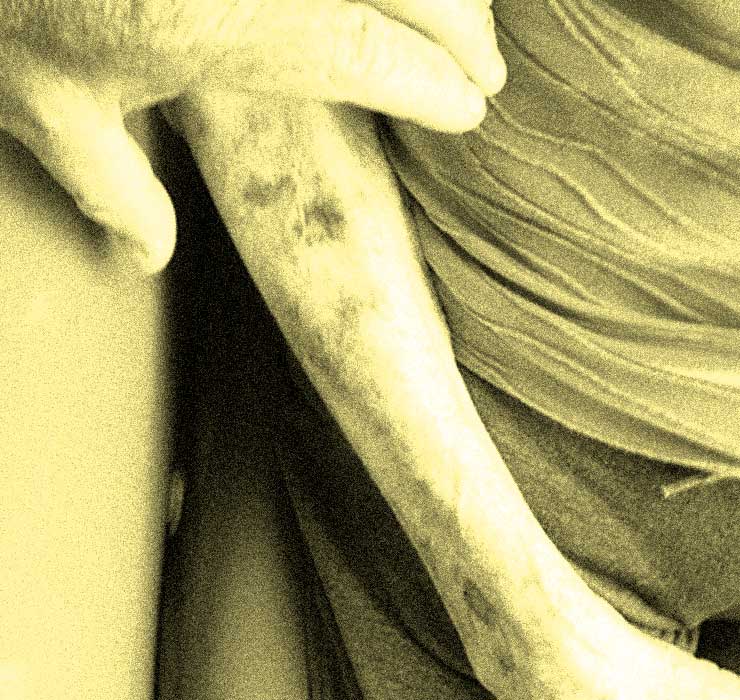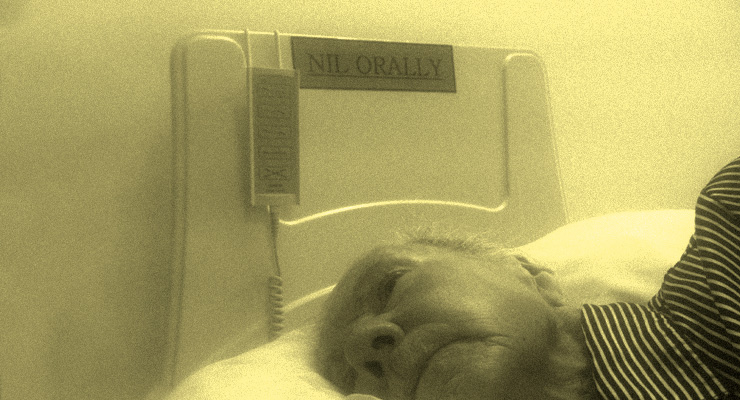
This is the second chapter of Jan and Sean’s story, part of Crikey’s investigative series Kidnapped by the State. For chapter one, go here, and for the full series, go here.
Some readers may find aspects of this article distressing.
81-year-old Jan Brandt went from climbing mountains abroad to being sedated, heavily medicated, and unable to move — all less than a year after being placed under the control of the state.
After Jan’s five-month stint in hospital following a hip fracture, requests to live with her son Sean Brandt were denied. The public guardian, who managed her medical care and personal life, decided, due to her dementia and risk of falling again, that she should go into an aged care home. The public trustee, who managed her money, decided it would be more cost-effective to do so.
So after five months in the hospital, Jan was sent to George Vowell aged care facility in Mount Eliza, more than an hour’s drive away from Sean.

Hospital to aged care home
As a previous Crikey investigation revealed, experts believe the guardianship system is used to “fast-track” elderly people into residential aged care due to the high costs of caring for those in their final years of life. Australia ranks 19th out of 20 OECD nations for people over 65 dying in their own homes.
Geriatrician and head of aged care research at Austin Health Michael Woodward — who was one of Jan’s treating doctors but declined to speak on her case specifically — tells Crikey that hospitals are often keen to get people from wards to facilities to reduce the burden on emergency rooms.
Working at the Austin, he said at some points there were 100 elderly patients in the 600-bed emergency room waiting to be transferred to residential aged care facilities. There, Residential Inreach Services, generally run by geriatricians, set up management plans for the patients to be treated in-house. This is preferential to having people spend hours or days in an emergency ward, especially with COVID-19, he said.
But those in aged care were often misdiagnosed: “Only about 50% of people with dementia actually have a formal diagnosis before they go into residential care,” he said.
“It’s not uncommon to assume that somebody who might be deaf or might have had a stroke that affects their speech has been here and sometimes that’s wrong.”
He said families should be proactive in finding preferred residential aged care, rather than waiting for a crisis, in order to avoid long emergency room stays and last-minute residential placements.
A step forward or back?
The George Vowell aged care facility is owned by Japara Healthcare — which has now merged with Cavalry, a facility that came under heavy criticism in the royal commission into aged care. Between 2015 and 2019, nearly 300 reports of alleged assaults against residents were made, including allegations of force-feeding, face-slapping and hosing a resident down with cold water. Several of those allegations were made against staff at the George Vowell facility between 2016 and 2019.
Sean took issue with his mother’s expensive outfits being replaced with polyester suits, her nails painted pink and hair put in pigtails: “Her sense of self was forcibly removed,” he said.
But it wasn’t just aesthetics that changed Jan: she was placed on dementia drug Aricept, antidepressant Pristiq and antipsychotic Risperdal.
Sean was told this was to help transition her into the facility and to stop behaviours like walking around at night and into other residents’ rooms.
Risperdal was originally designed for schizophrenia, and the use of it to treat dementia patients has been banned in the US by the Federal Drug Administration, with drug maker Johnson & Johnson fined $2.2 billion in 2013 for improperly promoting the drug to older adults, children and people with developmental disabilities.
A Calvary spokesperson told Crikey the company was unable to comment as it acquired Japara after Jan’s stay. “Calvary puts the health and wellbeing of residents first and all our services are being provided in accordance with the Calvary Mission and Values while following the recommendations of the Royal Commission into Aged Care Quality and Safety,” the spokesperson said.
A 2017 survey of Australian GPs found 91% had been pressured to prescribe psychotropic medications by nursing home staff following understaffing and under-resourcing in the sector. In 2016-17, nearly 30% of permanent care facility residents were being given at least one antipsychotic drug.
Former Australian chief medical officer Brendan Murphy told the aged care royal commission in 2021 that Risperdal and similar drugs were misused — or overused — in up to 90% of cases. The aged care royal commission ruled chemical restraint is only supposed to be used as a last resort.
But prescribing antipsychotics and antidepressants to residents of aged care homes isn’t uncommon, dementia expert Colin Masters said. “It’s very common because that’s what has been practised,” he said.
“Chemical restraints are being used with people in nursing homes, to flat out stop them doing other things, to be able to control and work with that individual, and help control their behaviour.” Treated behaviour could include getting up at night, going into the wrong room or not being compliant with staff orders, he said.

Jan’s condition rapidly deteriorated. She struggled to walk, developed deep purple bruises on her arms and lost weight. Sean continued to fight for the guardianship order to be removed and wanted the public guardian to speak to Jan’s regular doctors to have a better idea of her wishes and medical history. The public guardian can override a persons’ preferences to prevent serious harm.
Sean said the nursing home became hostile, with the public guardian limiting his visitation rights and staff threatening to call the police if he was late leaving from scheduled visiting hours. He said he was banned for a full month after visiting on a Wednesday instead of a Tuesday.
End of life care
Jan continued to deteriorate. In May 2015 she became drowsy, incontinent, stopped drinking and eating and was unable to swallow due to the risk of choking. Doctors at the aged care home decided to deny Jan all food and fluids and place her on palliative care.
In a landmark 2004 case, the Victorian Supreme Court ruled artificial nutrition and hydration through tube feeding for those who can’t swallow is a medical procedure that fell outside of palliative care — meaning doctors could decide to remove it as part of medical care that fell outside of the dying process.
This means the decision to stop Jan’s tube feeding was a medical decision that came down to doctors but had to be approved by the public guardian.

Woodward told Crikey that not allowing tube feeding to those who can’t swallow presented a grey area in treatment. “If [a patient] is at risk of aspiration, in other words swallowing the food fluid the wrong way, a speech pathologist might say that they can have nothing by mouth,” he said. “But in a person who’s in the terminal stages of cognitive disorders, I think they have [that right], even if it puts them at risk of dying.”
A number of concerns around palliative care were raised in the aged care royal commission. More than a third of personal care workers didn’t hold a Certificate III qualification, with palliative care largely unregulated. In 2021, the commission recommended palliative care training be provided to workers by July this year to allow more facilities to offer in-house, end-of-life care.
A few days after Jan was taken off tube feeding, Sean visited the facility and, noticing her breathing was laboured, called an ambulance. He wanted her to be transferred to another facility where she would be given IV fluids. The paramedics spoke to Jan’s public guardian, who directed them not to take her to the hospital, and keep her in palliative care at the aged care facility.
A spokesperson for the Office of the Public Advocate, which oversees Victoria’s public guardians, told Crikey a guardian’s role is to make a decision whether to consent or refuse medical treatment proposed by the treating medical practitioner, rather than to exercise clinical judgment to determine the appropriate treatment.
“To do this, they need to have sufficient understanding of the medical treatment proposed to exercise the functions set out in the legislation. Guardians are provided with detailed guidance and training to undertake their role,” the spokesperson said.
In 2020 new laws came into effect in Victoria, requiring guardians to give all practicable and appropriate effect to a represented person’s will and preferences if known — and only overriding them if doing so would prevent serious harm to their represented person.
Sean said despite Jan’s condition, he was told he couldn’t stay overnight with his mother. Jan died in the early hours of the morning amid the ongoing battle to revoke the guardianship order.
The costly aftermath
Sean has been driven in his search to discover how his mother’s end-of-life care plans could be taken away from her, sending hundreds of emails and contacting dozens of experts, politicians, advocates and commissioners. He says he’s spent tens of thousands of dollars in legal fees fighting the guardianship order.
He’s written to multiple politicians, including Greens leader Adam Bandt, who forwarded his complaints to then-attorney general Christian Porter. Porter’s office referred Sean to the aged care complaints commissioner. His complaint was sent to then-aged care minister Ken Wyatt, who recommended he complain to the Commonwealth ombudsman.
The aged care complaints scheme, operated by the Department of Social Services, declined to consider his complaints as “matters concerning the decisions of health professionals and the decisions of a guardian are outside [its] jurisdiction”.
Sean still has questions about his mother’s care. Was it right to move her into the aged care facility instead of allowing her to use her approved at-home care package? Was chemical restraint used? Why was Sean’s power of attorney overridden? Why did the state trustee charge so much?
“After she died I tried to make sense of all of this and for years it didn’t,” he said. “Once you’re in the system you can’t get out and you can’t be saved by the people who love you the most. You don’t exist.”
But with Jan gone, and with guardianship secrecy provisions limiting his access to medical records and other documents, Sean will likely never get the answers he seeks.
While we have been able to identify Jan for this story due to its particular circumstances, there are legal restrictions on the reporting of some guardianship matters, so please don’t identify yourself or others under guardianship or financial administration in the comments.








The irony is that all kinds of drugs are administered by “carers” without the approval needed by the patient.
If I wanted to end my life with drugs (Nembutal) before ending up in this situation, I’m not allowed to.
Calvary is a very resonant name for such an institution, given that anyone with some knowledge of the Christian gospels will recognise it as a place where condemned prisoners suffered the slow agony of death by crucifixion.
As a branding choice it seems quite brave.
Similarly the crucifix iconography – would 1 in a 1,000 xtians realise that the symbol of the nailed body was a po-mo male update of the ancient Goddess Inanna, hung naked on metal hooks for 3 days prior to being allowed home. (To visit her sister.)
Difficult to know whether the advice you receive from the Aged Care Commissioner’s office is impartial. My sister tried to lodge a complaint there just today. She was spoken over by the person she spoke to and could barely get them to understand what the complaint was. She was told to go to a lawyer (this is, btw, a standard response from most ombudsman offices. I experience it myself when I’m ringing as a lawyer to find out for a client if a complaint can be lodged. Talking over you is just the start of the issues). When the phone call ended, her phone had picked up the information from the phone number that the person from the Commissioner’s office was speaking from. A business card was sent to her phone. It was from an aged care home. The person from the Commissioner’s office had been calling from an aged care home. Impartial. Uh huh.
Thanks for that insight into the nuts of bolts of trying to raise an issue.
As a general point I’m quite disturbed by how many organisations, such as government agencies, utilities, banks and so on, try to ensure the public makes contact only by telephone and not by email. This is seldom satisfactory. If the matter to be discussed has any significant history, any technical details or anything else requiring careful description it is very difficult and time-consuming to explain it clearly in a phone call. If it takes more than one phone call the whole process usually has to start from scratch every time. It can be difficult to take adequate notes of the outcome of the call. Recording the call may not be legal or technically possible.
There should also be some consideration of the consequences of such policies for those receiving the phone calls. Even before any conversation begins a caller who would rather use email is going to be frustrated. As the difficulties of dealing with the matter on the phone pile up it is going to get worse. Even if the caller manages to control their temper the call can be hard to handle properly and there is almost no chance the person answering the call is in a position to resolve anything serious. The chances of the caller having a melt-down are high and handling these calls must be stressful.
I worked for a time at a federal government agency where staff were instructed not to conduct important matters over the phone. They had to use email or write letters. This ensured a full and accurate record of all communications. It seems obvious that the agencies and others that force the public to use phone calls are determined to avoid anybody having a full and accurate record. It is done to deter the public from contacting them, preserve deniability and avoid accountability. These bodies should not be permitted to avoid contact by email .
Yes, but you also find it the other way around – sites where the only way you can make contact is by a form on the site. No phone number at all. There are still a significant number of people who don’t use the internet much and rarely use email. This is not necessarily age based, but has to do with a lot of factors including access to technology and access to stable internet connections. So really both need to be an option.
Not to mention the long delays that often apply (active discouragment?). I tried to change a Qantas booking recently – not possible online, please phone one of our helpful staff …. Quoted waiting time was 2 hours 10 minutes, no offer to call me back. I gave up, reminded me of the Bob Dylan lines:
“When you hear the beep it will be three o’clock”
She said that for over an hour
And I hung up
The whole mechanism is meant to ensure that nothing actually ever get properly sorted out.
There is the deniability factor “I don’t recall that information being given” and “I don’t recall this conversation”.
The question is “How much income does the public guardian and the public trustees office generate?”
And “how are we going to stop this malfeasance from ever entering our lives?”
Excellent questions – none should hold their breath awaiting an answer.
“contact only by telephone and not by email.” That hits a button with me. In face to face contact I am simply not very good at communicating. I am not good at talking. In social situations I am usually the silent person listening to others. But I like to think I am much better at writing. I get SO annoyed with so many people who want to make phone calls or hold meetings because their particular disability is that they think with their mouths.
The Aged Care Royal Commission was sorely limited, missing a once in a generation opportunity. Outrageously, the word ‘violence’ wasn’t uttered once in the report, yet this is precisely what thousands of older people face in so called aged care. A Sydney based academic, Linda Steele, is looking at these issues through a reparation lens, asking how this violence can be renamed as ‘service failure’. Just because violence is enacted by a paid worker, doesn’t mean it’s not violence. Amber, I hope you can take a look at the serious shortcomings of that RC, though I acknowledge that even it’s limited recommendations are clearly in the breach, which deservedly warrants pointing out, as you do in this story.
Guardianship secrecy provisions must be removed in all states.
If you see a politician covering this up, do not vote for that person or party.
In a sense, what I just asked you to do there… vote independent or Greens in every state.
Yes, it’s that bad, I know I too am living with this.
How does one avoid becoming a victim?
See my request, all states are doing this right now.
Tasmanian Parliament, you (all parties) can make history, all eyes are on you today and next week.